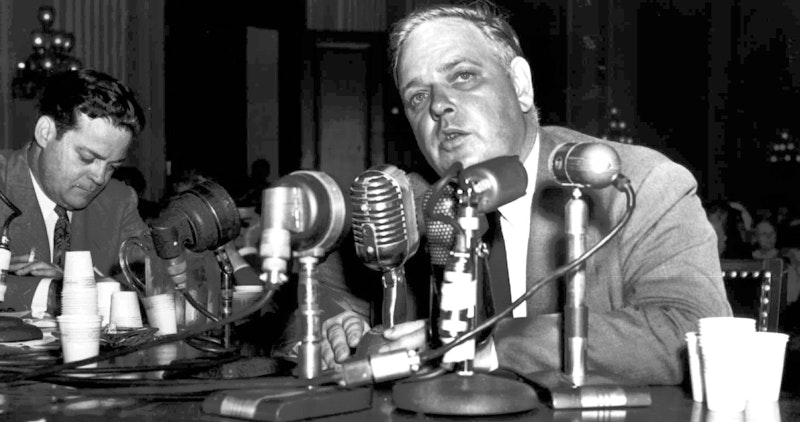To see the actual in the abstract—to look again, and again, and see the same thing—is to see the hell that is heaven on earth: that the blood-dimmed tide will drown innocents and damn the survivors. To bear witness to a second coming of evil in Europe, warning of the ghosts on the roof and the enemy in the room, is to fight for the survival of Western civilization. To be the star witness in this trial is to be an outcast of truth and an essayist for Time, for the words of Whittaker Chambers are forever.
The words are a projective test of moral intelligence, of Chambers’ refusal to see the positive in the negative, because of his bias against communism.
The words reveal the graphic in the idiographic cards of psychology, or bloodstains in the inkblots of psychohistory, due to Chambers’ assessment of Joseph Stalin.
The words reveal the truth about Stalinism: that behind the hammer and sickle—behind the tools of workers and peasants—lay the instruments of murder and terror; that behind the world’s largest country lay an island chain of prison camps and captive nations; that behind a series of secret trials lay roundups and forced confessions; that behind the image of Stalin himself, and of a red star screaming across the sky, lay the impact crater of mass destruction.
The truth is in Time’s cover story from February 5, 1945.
Thanks to Henry Luce, the publisher of Time, we have a record of the truth.
We also have Chambers’ words before and after Yalta, ending with his piece on “Christmas 1945.” The piece is Chambers’ music, an ode to the Inner Light of the Society of Friends, like the way that chamber music is the “music of friends.”
The piece combines the plain speech of Chambers’ faith, of devotion to the Son, with reverence for the descendants of the father of the Jews—in remembrance of the millions who died in concentration camps.
Chambers pays his respects, honoring not only the dead but the living, for he writes as the husband of a Jew.
He performs a requiem for the wretched—and provides a resource for the living.
He writes as a former member of the communist underground, able to read and interpret the map of Europe.
Here is the prophet armed with knowledge and fury, whose enemies have malice toward all and charity for none.
Here is where Chambers contrasts the light of truth with the wisdom of fools, answering the burning question of what is to be done with what was done in the deadliest war in history.
Here is an apostate who knows the truth, that no fire—not even a bomb with unlimited firepower—can match the infinite nature of God.
In a universe of 200 billion trillion stars, Chambers focuses on the glory of the Christmas star.
His call for humility—the ultimate humility—recalls a fundamental truth: that among the truths we hold to be self-evident, and with regard to our particular customs and manners, we should tremble for our country when we reflect that God is just.
We must never forget who was with us in weakness, and in fear, and in much trembling.
We will tremble if we forget the central tenet since time immemorial.
You shall have no other gods before Me.
—Follow Bill Asher on Twitter: @BillAsher18

